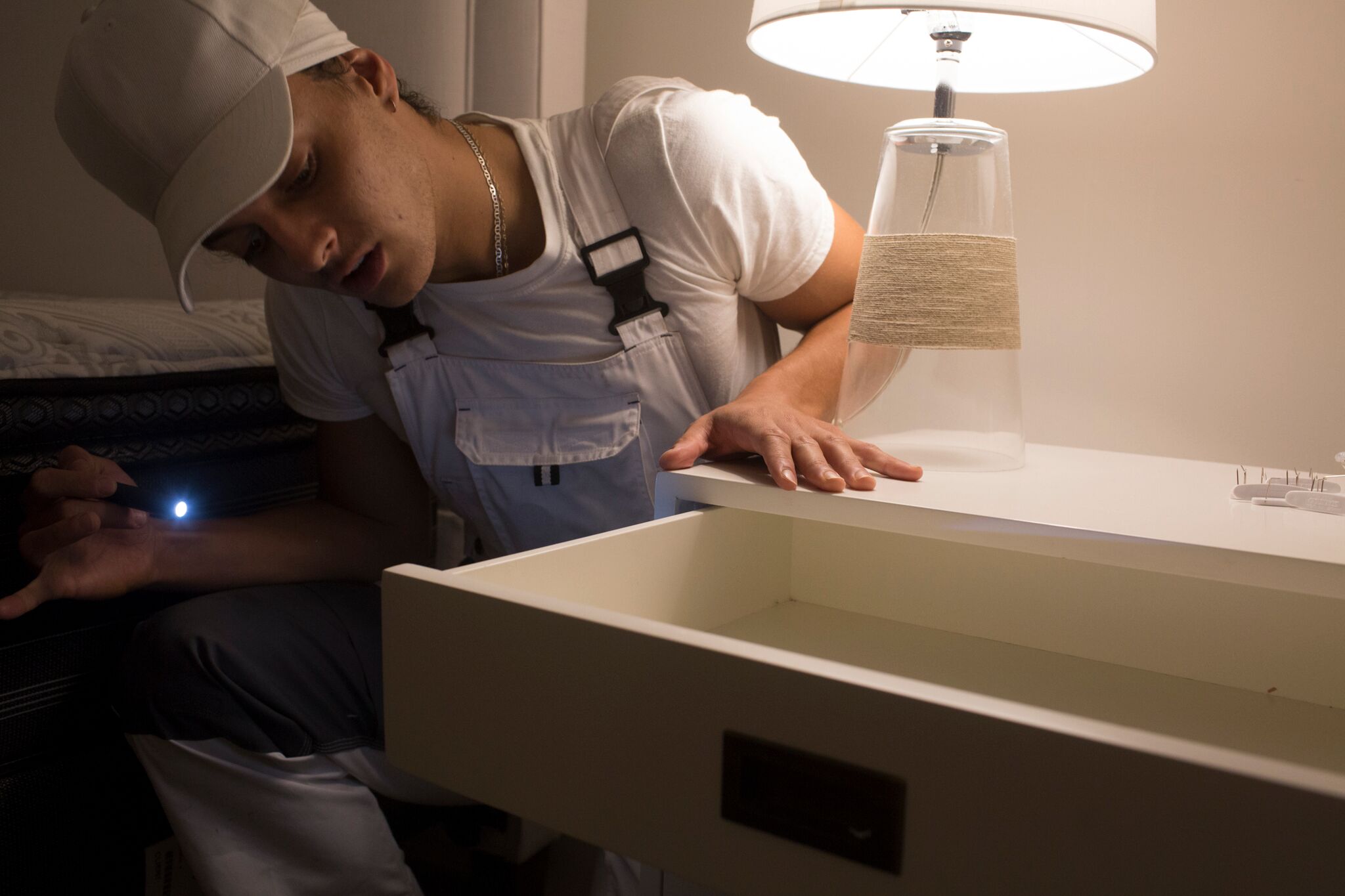How to Get Rid of Bed Bugs - Toronto
One of Addison’s Pest Control Technicians performing a bedbug inspection.
Identifying an Infestation in Your Toronto, Ontario Home
Here’s how to get rid of bed bugs in Toronto, - in summary - but it’s important to apply multiple treatments to ensure you’re covering all the bases. First, apply heat, then use a powder insecticide that’s made to treat bed bugs, and finally use a residual spray that kills bed bugs on contact and the droplets will continue to kill any bed bugs that remain in the home as they come into contact with that residual treatment. A professional bed bug exterminator will cover all of these bases for you to help eradicate the problem. If you are searching for Toronto bed bug removal, contact Addison Pest Control at (416) 628-6963 or use our online form. We would be happy to provide a free quote for bed bug removal services.
Have you been experiencing minor to severe skin bumps, welts, or irritations that you can’t explain?
Did you find one or more, live or dead bed bugs or bugs you don’t recognize?
Have you discovered that your neighbours, friends, or family members have been exposed to a bed bug infestation recently?
On This Page: How to Get Rid of Bed Bugs?, How Common Are Bed Bugs in the GTA?, How Do I Prevent Bed Bugs?, DIY Bed Bug Inspections, Can I Get Rid of Bed Bugs Without An Exterminator?
The most common types of bed bugs associated with an infestation in homes, hotels, and other businesses are Cimex lectularius and Cimex hemipterus. While C. lectularis is mostly a cosmopolitan species and is what is most likely infesting your Toronto area home or business. C. hemipterus is a more tropical species - unlikely to be in your Toronto home unless you picked up a tropical type while abroad. Treatment of both types is the same - and Addison’s 3-step process will help you eradicate the problem quickly and efficiently
Before we can even get started on treatment, we need to identify the infestation. Bed bug extermination in Toronto is complex, and a professional is equipped to quickly address the problem. Bed bugs are small and reddish-brown in color, and are typically about the size of an apple seed. They are most active at night and are usually found in clusters near the seams of mattresses, in the folds of sheets, and in other areas where people sleep.
Once you have identified the presence of bed bugs, it is important to isolate the affected area. This will help prevent the bed bugs from spreading to other parts of your home or to friends, families, or other Ontario businesses. While the temptation may be just to bag everything up and throw it away, it’s likely, not necessary as heat and hot water will kill bed bugs - and laundering as much as you can, should suffice after we’ve treated your home. Prior to us coming in for treatment, you should also vacuum the area thoroughly, paying particular attention to cracks and crevices where the bed bugs may be hiding. Make sure to bag the debris from your vacuum in a sealed plastic trash bag right away for disposal.
How To Get Rid of Bed Bugs in Your Home Near Toronto, ON
You may be wondering, “How do I get rid of bed bugs in Toronto?” Getting rid of bed bugs in Toronto involves a combination of methods for effective control. These methods include:
Steam cleaning
Vacuuming
Heating
Freezing
Washing
Discarding infested items
It's recommended to start with steam cleaning, as this can flush out any bed bugs that may be hiding, followed by thorough vacuuming to remove them. However, it's crucial to note that heat treatments, which involve raising the temperature to exterminate bed bugs, should be left to our professional bed bug exterminators that have expertise in pest control. These methods combined can help in eradicating bed bugs from your home in Toronto, ensuring a pest-free and comfortable living space.
Our Innovative Strategy For How To Get Rid Of Bed Bugs in Toronto
Our first step in treating a bed bug infestation is to apply heat to the area. We use commercial heaters that emit temperatures in excess of 120 degrees to first eradicate any larvae, eggs, and active bugs on your furniture or in your bedding. The downside of using heat is it does not offer residual protection - once the heat is gone - anything that lives or is nearby can migrate back into that spot. That’s why Addison uses a three-step approach to bed bug treatment and eradication.
The next step in exterminating bed bugs is to treat the infested area with a suitable commercially available powder insecticide. This is suitable for the treatment of cracks and crevices that the heat may not have penetrated as a way to eliminate bed bugs that are hiding. The powder is sprinkled and dusted into these areas and works as an abrasive to cut up the bed bugs and eliminate them. The powder injected into your walls and cracks and crevices also creates a barrier to protect from adjacent properties and is a long-lasting solution, unlike steam or heat.
Finally, our last step is to apply a fine mist of residual spray to all infected areas and adjacent areas. This will stamp out bed bugs on contact and it will form a residual treatment to continue killing any bed bugs that are left in your home as they try to move closer to where humans rest, like mattresses, sofas, chairs, etc. Because this is such a fine spray, it should not damage any of your furniture or fixtures. This fine mist will coat any surface that may harbor residual bed bugs and can last up to 6-months. These steps (both the powder and spray treatments) also use chemicals that are 100% approved by the Ontario Ministry of Environment as safe and non-toxic for humans and animals of all shapes and sizes.
Here’s what to expect from Addison's Broad Spectrum Inspection:
Our priorities: thoroughness, clarity, honesty
We inspect for a wide range of pests: bed bugs, carpet beetles, cockroaches, mites, fleas, ants, wasps, and more.
We will answer all your questions and provide a no-obligation quote on the spot
We arrive at every inspection prepared to perform a full treatment to get rid of your problem the very same day.
The inspection fee goes towards the cost of treatment.
Flexible scheduling with 24/7 same-day service throughout the GTA. Looking for pest control in St. Catharines? Contact us today!
Addison has...
Decades of experience
A trusted track record
All-inclusive warranty
Comprehensive customer service
Rigorously trained technicians
Tried and tested extermination methods
The safest, most effective insecticides
Our Process
Step 1: Bed Bug Heat Treatment
Bed Bug Heat Treatment
Category:
Physical
Equipment:
Handheld bed bug heat treatment gun.
Method:
Direct heat is applied locally to beds, couches, chairs, and any other area of bed bug concentration.
Strengths:
Heat Kills Bed Bug Eggs.
No damage to the furniture.
Instantly kills all bugs and eggs treated.
Avoids pesticide resistance.
Weakness
No residual protection.
Only kills the bugs and eggs that are visible and accessible to technicians.
Not sufficient without other complementary bed bug extermination techniques.
Step 2: Bed Bug Powder Treatment
Bed Bug Powder Treatment
Category:
Physical + Chemical
Equipment:
Power duster
Method:
A fine silica dust insecticide is injected into all crevices and wall cavities through electrical sockets and gaps underneath baseboards.
Electrical items, such as a power bar, stored close to or underneath the bed are also treated with powder.
Strengths:
Cuts up the bed bug's abdomen.
Coats the insides of the wall cavities to create a protective powder barrier around your home.
No bed bugs can spread to or from attached houses, adjacent apartments, or condo units.
Essential lasting protection.
Fully approved by the Ontario Ministry of the Environment, safe and non-toxic for humans and animals of all shapes and sizes.
Weakness
Only suitable for crack and crevice treatment.
Step 3: Bed Bug Spray Treatment
Bed Bug Spray Treatment
Category:
Chemical + Residual
Equipment:
Precision surface sprayer
Method:
A fine mist of residual spray is applied to the backs, sides, and bottoms of box springs, mattresses, bed frames, couches, chairs, baseboards, door jambs, and floors throughout the home.
Strengths:
Kills bed bugs on contact and remains active as a protective surface treatment to continue to kill bed bugs as they come out of hiding.
Keeps your home and furniture protected for up to 6 months.
Fully approved by the Ontario Ministry of Environment, safe and non-toxic for humans and animals of all shapes and sizes.
Fully approved by the Ontario Ministry of the Environment, safe and non-toxic for humans and animals of all shapes and sizes.
Weakness
If used improperly, may promote pesticide resistance.
Prevalence of Bed Bugs in the GTA and Southern Ontario
Bed bugs are very common in the Greater Toronto Area and Southern Ontario. In fact, Southern Ontario is home to 15 cities of the top 25 bed bug cities in Canada—that’s about 60% of Canada’s bed bug infestations. If you live in the GTA and surrounding area, there is a high likelihood that you will encounter bed bugs in your home or place of business at some point.
Some of the factors contributing to the spread of bed bugs are:
Not everyone reacts to bed bug bites, which can make spotting an infestation in the early stages a major challenge.
Increasingly dense living conditions
public stigma
ineffective pest control companies
irresponsible slumlords
increased international leisure travel
CALL US TO BOOK A SAME DAY INSPECTION
VERY IMPORTANT:
Bed bug “bites” are an allergic skin reaction to the anticoagulant and anaesthetic agents in bed bug saliva
About 30% of people are not allergic to bed bug saliva
Therefore 1 in 3 people shows NO skin reaction when bed bugs draw their blood
How Do I Prevent A Bed Bug Infestation In My Home Near Toronto?
The best prevention of a bed bug infestation is to not bring home bed bugs in the first place or to avoid coming into contact with bed bugs that may cause an infestation in your own home. Here are some steps you can follow to mitigate an infestation.
Regularly wash and dry your bedding and clothing in the hottest setting possible. This will stamp out any bed bugs that may be lurking in your linens.
Use a high-quality encasement on your mattress and box spring to prevent bed bugs from hiding inside.
When traveling, inspect your hotel room for signs of bed bugs, such as dark spots on the mattress or tiny red eggs on the bed frame. If you see any signs of bed bugs, request a different room or change to a completely different hotel. Get your suitcase and belongings out of that room as soon as possible.
When returning home from a trip, inspect your luggage carefully and wash any clothing that may have come into contact with bed bugs.
Do-It-Yourself Bed Bug Inspections
If you know what you are looking for a thorough visual inspection is the most reliable way to spot an infestation even in its earliest stages. There are not any really effective home remedies to get rid of bed bugs - the most effective chemical treatments are restricted to use by licensed exterminators. While you can try to get rid of bed bugs without an exterminator - we highly recommend against it.
Bed bugs can be very stealthy pests, however, and spotting the early warning signs of an infestation often takes the experienced eye of a professional pest control professional. Call us to book an inspection service, we can almost always get there on the same day.
What you'll need to do a bed bug inspection:
flashlight
small spray bottle
magnifying glass
Latex gloves
What Furniture bed bugs infest:
Any furniture where you sit sleep or rest for more than 45 minutes per day such as couches, chairs, mattresses, box springs or bed frames.
Bed bugs cannot penetrate fabrics. They cannot live INSIDE of a mattress or pillow.
The less clutter and storage underneath and around the beds couches and chairs the more thorough and conclusive an inspection can be.
How to Inspect for Bed Bugs:
Use Your flashlight to look carefully at every surface on or close to furniture where you spend 45+ minutes per day.
Focus especially on cracks, folds, seams, and corners.
You will need to prop up your mattress and box spring and flip over your couches and chairs.
Focus on the the surface and seams in these places:
the bottom of the mattress
box spring: always pull off the dust cover, and check the plastic cups at the corner
bed slats
bed frame
the headboard: front and back
the underside, cracks, and drawer tracks of side tables
all items in storage bins or drawers underneath the bed
folds of the bed skirt
baseboards around the bed
electrical sockets around the bed
picture frames hanging above the bed
curtains close to the bed
couches
lazyboys & recliners
office chairs
any piece of furniture within 4 feet of beds or couches
What You’re Looking For In A Home Inspection for Bed Bugs
Bed Bug Fecal Markings
Round dark rusty-brown dots about the size of a pinhead clustered around areas of activity
Bed bug feces dried blood
If you wet these spots with your spray bottle they will leave a smear marking
Bed Bug Eggs
Glassy white and oblong in shape
Often be clustered together in a protected area close to the bed or couch surface
Bed bug eggs hatch within 10-14 days
Bed bug Nymphal Skins
wispy exoskeleton casing
light tan translucent colour.
Bed Bug Nymphs
Nymphs are smaller and lighter in colour than adult bugs
They can be smaller than one millimeter about the size of a grain of salt
If nymphs have fed they have a dark red dot on their interior
Live Adult Bed Bugs
Adult bed bugs are about the size and shape of an apple seed
An oblong abdomen that narrows towards their back end
Bed bugs have a single pair of antennae and a pair of wing pads.
They have a series of horizontal segments along their dorsum that will expand when they are full of blood
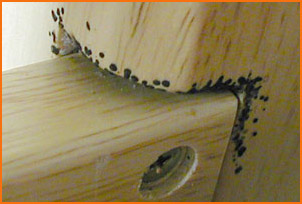
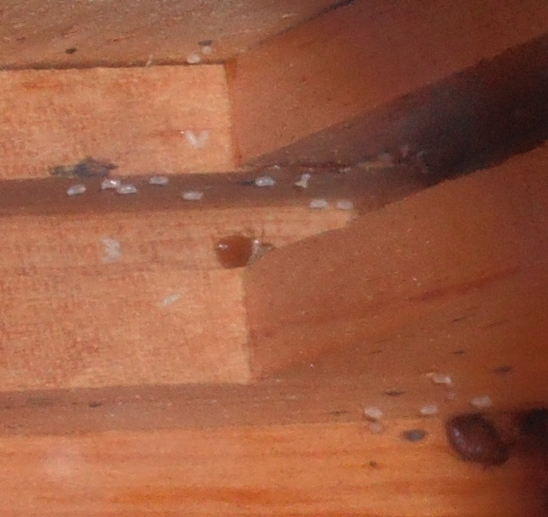
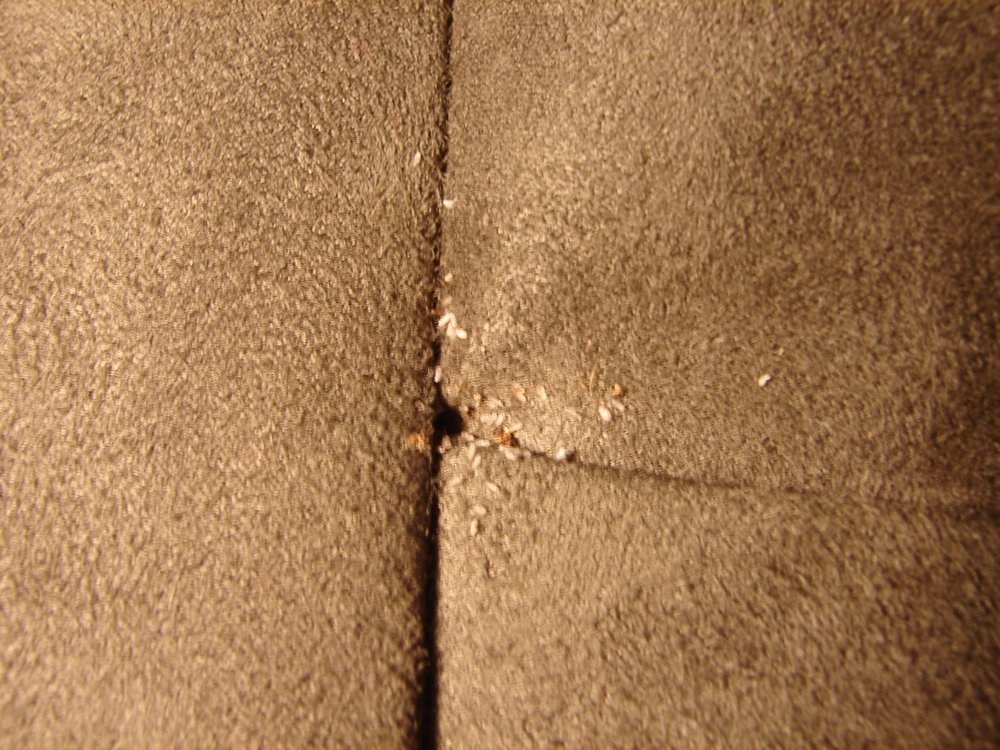
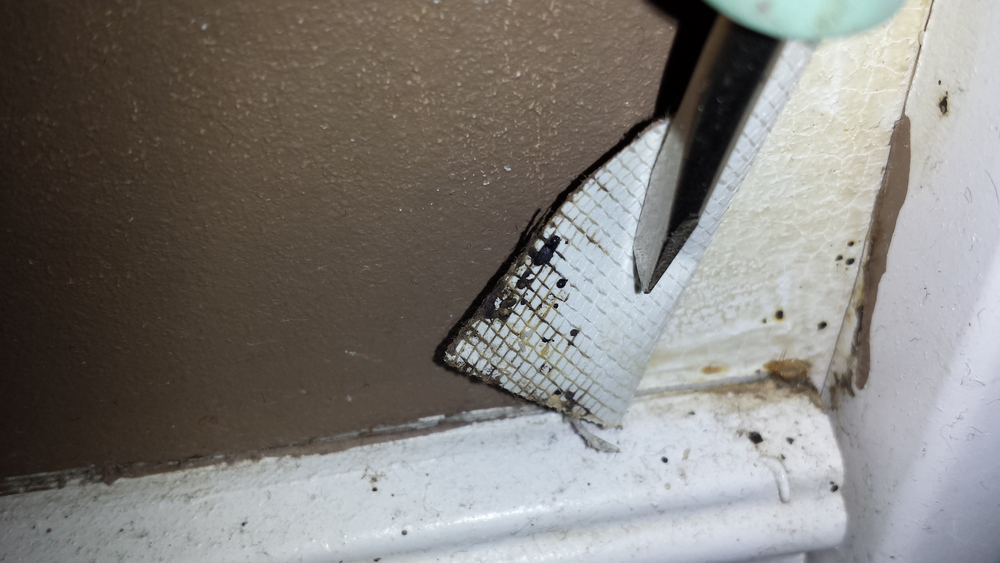
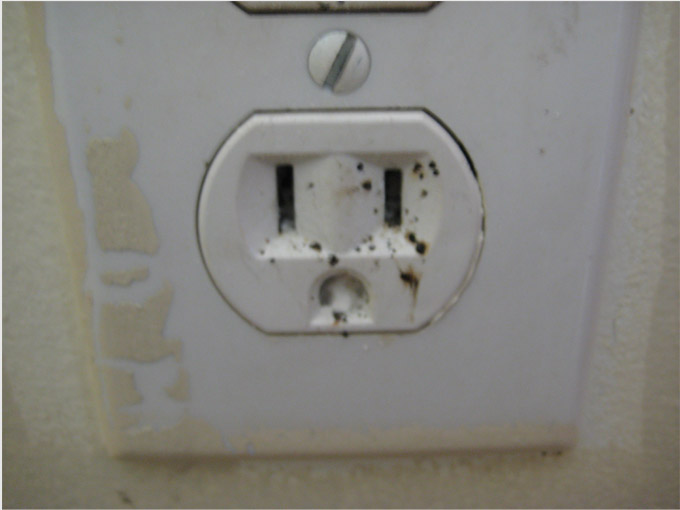
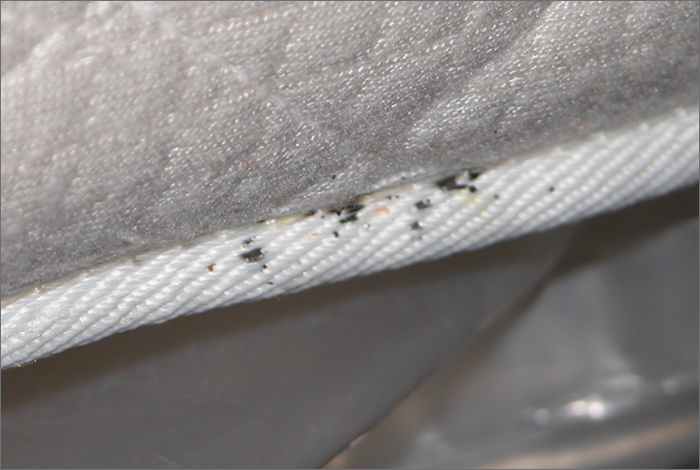
Can I Get Rid Of Bed Bugs Without An Exterminator?
While it is tempting to treat bed bugs on your own with store-bought chemicals and by throwing everything away - the chemicals sold “over the counter” are not as effective or long-lasting as those available to a licensed bed bug exterminator.
There are a few things you can do if you think you’ve caught the infestation early - for example, if you just got home from a trip and know you picked up bed bugs while you were gone - you can immediately wash everything with hot water and dry it in a hot dryer. You also should clean your shoes, suitcase, and other hard surfaces that cannot be laundered with a disinfectant that will kill the bed bugs.
We advise at the minimum an inspection after you do your home treatment, and to monitor your mattresses and furniture very carefully for signs of infestation after treatment. It’s important to treat early and effectively to mitigate the damage from bed bugs.
Are There Home Remedies to Get Rid of Bed Bugs?
You may be wondering if there are home remedies to get rid of bed bugs.
You can initially attempt a home remedy bedbug removal without the use of chemicals. These pests are susceptible to high temperatures, such as 115°F (46.11°C), or extreme cold, around 32°F (0°C).
Here are several methods for addressing bedbug infestations using these approaches:
Launder bedding and clothing in hot water for 30 minutes, then dry them on the highest heat setting for another 30 minutes.
Employ a steamer on mattresses, sofas, and other potential bedbug hiding spots.
Seal infested items in black bags and place them outdoors on a hot day with temperatures reaching 95°F (35°C) or inside a closed vehicle. In cooler weather, it may take 2 to 5 months to eradicate sealed bedbugs.
Freeze bags containing bedbugs at 0°F (-17.78°C), using a thermometer to monitor the temperature. Leave them in the freezer for at least 4 days.
After eliminating visible bedbugs, create an inhospitable environment for any remaining ones. Cover your mattress and box spring with bedbug-proof encasements, ensuring they are completely sealed. Bedbugs trapped inside will perish, and new ones will be unable to enter.
If these methods prove insufficient in eliminating all the bedbugs, you may need to consider using an insecticide as an additional measure.
We generally discourage the use of “home remedies” to treat a bed bug infestation. While certain remedies might cause the bed bugs to scatter, they’re extremely unlikely to eliminate the infestation. They may simply be leaving the area you treated with your remedy and migrate back after the scent or chemical dissipates. Our powder treatment and spray-on treatment will last up to 6 months.
What you need to know for an effective bed bug treatment near you in Toronto & the GTA
If you suspect you have a bed bug infestation clear and complete information is the first step to getting rid of them. Here are a few facts, myths, and tips that will help you to make a well informed decision about what to do next.
Bed Bugs are parasites:
They feed exclusively on mammalian blood.
Bed bugs will hide and lay eggs as close as possible to places where we sleep or sit for more than 45 minutes per day.
They seek out hiding spots that are dark, sheltered, undisturbed and as close as possible to the sleeping surface
Bed bugs will only infest the closets, dressers or bookshelves, kitchens and bathrooms when an infestation has become severe.
Bed Bug Infestations near Toronto CAN be eliminated.
Don’t believe the horror stories about unbeatable infestations, skyrocketing pest control fees, throwing out precious furniture, eviction, or endless bed bug recurrences.
Most of these stories are the result of irresponsible or ineffective pest control companies
Do not throw out your bed! This will NOT eliminate the infestation.
Efficient, safe, and complete bed bug remediation requires a varied, thorough, professional treatment.
Check out our treatment process above for more details about our method.
Bed Bugs can infest anyone, but not everybody reacts to bites
Not everyone reacts to bed bug bites.
The bites are allergic reactions to chemicals in bed bug saliva that they inject as they draw a blood meal.
Up to 30% of people show no skin reaction to bed bug bites.
Any home can become infested with bed bugs
Cleanliness, new furniture, new buildings do not protect you from bed bugs
If you have less clutter and check your mattress often you will be more likely to spot an infestation in the early stages.
Bed Bugs are stealthy pests:
Can infest for months without being seen
Can hide deep inside a crevice in the bed frame or box spring, inside boxes and storage under the bed, or even inside a wall socket or power bar.
Emerge when we are asleep
Pick up on increased CO2 output, increased body heat, decreased body mobility and ambient darkness which tell them it is safe to come out of hiding and feed.
Bed Bugs don’t spread disease
Unlike mosquitoes and ticks, bed bugs DO NOT transmit communicable diseases.
What A Happy Client Says About Addison on Google
“My family’s apartment was infested with bed bugs. The building’s pest contractor did a treatment but that didn’t work; it only dispersed them. So, I called Addison, based on the high ratings and reviews, and I was not disappointed. They were very responsive and scheduled me quickly. The first spray went well; the technician (I’m very sorry, I can’t remember their name but they were awesome!) was super knowledgeable, attentive, and friendly. They answered all of my questions and I felt reassured by their presence. I recently scheduled a second treatment, and Jesse was also awesome—on time, super friendly, reassuring, and knowledgeable. Jesse even went above and beyond by helping me get my (very stressed) cat into his carrier, which I super, super appreciated (we both got out of there unscratched, thank God!). I don’t normally leave reviews but I had to give props to this great and professional staff, who got the job done quickly and swiftly. Will definitely use Addison again. Thank you!”
We’re proud of our 4.9/5 rating on Google across 1261+ reviews

